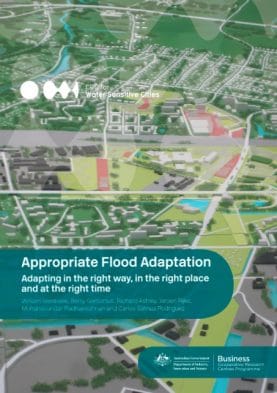New publication: Appropriate flood adaptation
 Climate change-induced extreme weather events are already forcing slow adaptation by existing cities, many of which are now demanding a reconsideration of how built-up areas are designed.
Climate change-induced extreme weather events are already forcing slow adaptation by existing cities, many of which are now demanding a reconsideration of how built-up areas are designed.
A new report by researchers in the CRC for Water Sensitive Cities’ (CRCWSC) project Socio-technical flood resilience in water sensitive cities: Adaptation across spatial and temporal scales (Project B4.2) provides insights into why and how cities are increasingly improving their climate change preparedness through the process of ‘mainstreaming’.
Mainstreaming is the practice of integrating adaptation into decision-making across a range of policy areas, rather than by implementing standalone measures. To be successful, the practice needs to be followed by the full suit of government departments, particularly by policymakers in urban planning, environmental management, urban drainage and water management.
The report, ‘Appropriate flood adaptation: Adapting in the right way, in the right place and at the right time‘, was developed by William Veerbeek, Dr Berry Gersonius, Professor Richard Ashley, Jeroen Rijke, Mohanasundar Radhakrishnan and Carlos Salinas Rodriguez from UNESCO-IHE Institute for Water Education.
Their guideline aims to “provide an accessible step-by-step approach for adaptive planning aimed at increasing resilience against climate-related natural hazards.” “Adaptive planning addresses an essential prerequisite for enhancing resiliency, namely: managing uncertain future conditions. The adaptive planning approach does not necessarily focus on a single threat, but can be used to manage a wide range of bio- physical or socio-economic drivers,” the authors said.